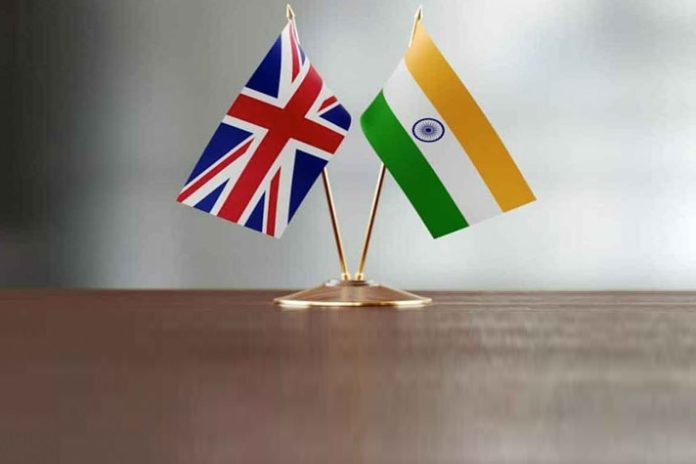New Delhi (NVI): With a robust economic foundation based on job creation and shared prosperity, UK-India bilateral trade has the potential to increase to £50 billion from the existing £24 billion, a new report suggests.
The new research report, ASCENT: The New Horizon of Trade Relations, maps the dynamics of trade growth between the UK and India in the context of a 48 per cent rise in bilateral trade from 2016 to £24 billion in 2019.
The research report takes a deep dive into the UK-India trading relationship and focuses on opportunities for both countries against a changing global backdrop and rising ambitions, according to statement issued by FICCI.
The data and insights in the report highlight the extent of the UK-India trade relationship and showcases the richness of British and Indian investments in one another’s countries. the statement added.
The report analyses trade in detail, pinpointing a variety of focus industries, including apparel and homeware (£2.4 bn per annum in 2019) and advanced engineering.
It also examines a variety of fast-growing categories including UK exports of fish and seafood, whey protein, scientific and measuring instruments, pharma, heavy electrical machinery and chemicals, and Indian exports of optical fibre, surveying instruments, advanced engineering, and packaging materials.
In addition to this, emphasis on the importance of trade in services for both countries (82% of goods in 2019, up from 47% in 2016) has been laid in the report.
Speaking at the launch of the report, Alan Gemmell, Her Majesty’s Trade Commissioner for South Asia commented, “This new report on the potential of the UK-India corridor follows this week’s hugely successful visit by International Trade Secretary, Liz Truss. That visit set out plans to launch an Enhanced Trade Partnership when the British Prime Minister visits India later this year.”
“Already this week we have announced additional investment in jobs in the UK from top Indian businesses – with Tata Consultancy Services bringing 1,500 high-skilled jobs to sites across the UK and Indian pharmaceutical and biotechnology giant Wockhardt creating 40 new jobs in Wrexham,” he added.
Earlier this week, UK International Trade Secretary Liz Truss has concluded her 5-day visit to India, mapping the path to a potential future free trade deal and deepening trading ties between the UK and India.
Gaitri Issar Kumar, High Commissioner of India to the UK, during the report launch said, “I congratulate all partners of High Commission of India, London, FICCI, Sannam S4, Santander UK and Taylor Wessing, for their contribution to the report.”
She said, “India and the UK are, today, committed to forging an Enhanced Trade Partnership aimed at achieving prosperity, generating jobs, developing skills, and facilitating essential supplies for the benefit of both our peoples. We have identified our complementarities across the sectors – which offer both sides tremendous opportunities for a win-win outcome.”
“ASCENT includes case studies that help to identify drivers of exports and imports and main contributors to the creation of value chains on both sides,” she said.
“It also analyses the interplay between trade and FDI and will be a useful handbook for businesses and investors on both sides,” she further added.
Meanwhile, Usha Prashar, Chairperson FICCI UK Council stated that while UK-India trade is already an impressive £24 billion annually, a step on the journey to build a stronger UK-India relationship over the next 10 years is a realistic focus on reaching £50 billion.
“India and the UK should aim at using the Enhanced Trade Partnership to jointly work on critical global issues of climate change, supply chain, defence and security, amongst others,” Parashar noted.
As the global economy emerges from the pandemic and both the UK and India seek to achieve their individual goals, it will be even more critical for businesses in both countries to source new revenue streams and evaluate their supply chains.
“It is encouraging to see the UK more than doubling its exports to India across a number of sectors like pharmaceuticals, chemicals, electrical machinery and seafood over the last five years, John Carroll, Head of International and Transactional Banking, Santander UK said, while adding that India was in the top five countries UK businesses wanted a trade agreement with post-Brexit.
This strong momentum reflects the potential of this partnership as India continues on its high-growth trajectory in a post-Covid-19 world.
Furthermore, ‘ASCENT’ provides case studies of small, medium, and large organisations operating in the UK-India trade corridor, showcasing a wide variety of experiences across industry sectors.
It also echoes the importance of the ‘people-to-people’ connections; the ‘living bridge’ between the two countries as characterised by a dynamic and engaged 1.5 million-strong Indian diaspora.
Notably, education, too, further deepens the relationship, with the UK’s long-standing status as a leading study destination for Indian students eager for a quality education overseas and the extensive opportunities presented by universities in both countries working closely together.
-CHK








